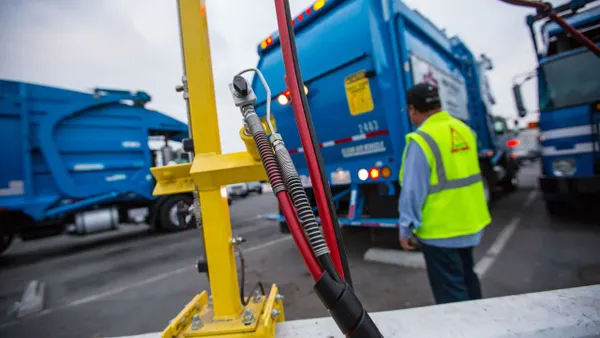UPDATE April 12, 2018: Green Century Capital Management learned this week the Securities and Exchange Commission (SEC) blocked a shareholder proposal that asked Amazon to issue a report on efforts to manage food waste.
Green Century called Amazon’s move to block the shareholder proposal “surprising,” and said it puts Amazon in “stark opposition” to companies that publicly disclose progress toward waste reduction goals.
Amazon says it donates food to avoid waste and is working with vendors to improve packaging.
Dive Brief:
- Investors, including Green Century Capital Management Inc., are pushing Amazon to publicly address how much food from its grocery operation goes to waste, according to The Wall Street Journal.
- The investors asked the Securities and Exchange Commission (SEC) to force Amazon to allow its shareholders to vote on a motion asking the company to explain its plans for mitigating the cost and environmental damage of wasted food.
- Amazon told Green Century in January that food waste "wasn't material," and that food represented less than 1% of its operating expenses and assets in 2017, enabling the company to exclude the proposal under SEC rules.
Dive Insight:
Amazon has a history of pushing back on shareholder proposals, so a lack of compliance on this request would not be surprising. Also, according to the company, Amazon already donates food in the U.S. through Feeding America — which included 17 million pounds in 2017 alone. But even with these measures, greater opportunity may exist for the e-commerce giant.
The idea of corporations taking responsibility for reducing solid waste has been gaining some steam lately. Dunkin' Donuts announced it is phasing out polystyrene foam from U.S. stores; Coca-Cola wants to make more of its packaging recyclable by 2020; and McDonald's aims to recycle all of its customers' packaging by 2025.
Corporations cutting back on packaging and food waste could both be positives for local recycling programs. Cleaner, more easily recycled packaging could help lower contamination rates and increase the value of material bales. Diverting organic waste, which is heavy and bulky, could save haulers in transport costs and keep airspace in landfills from filling up.
In that vein, Amazon has touted the work of its "Frustration Free Packaging" initiative, though some consumers and consumer groups look for more from the company. Greenpeace, for example, has called Amazon one of the least-transparent companies when it comes to its environmental actions and performance.
In addition to reducing the amount of food which would wind up going to a landfill if not donated or composted, Amazon could also gain some financial benefit. ReFED said in a January report that food waste is a multi-billion dollar opportunity for retailers. The point of the report was to show that, rather than diverting food waste being viewed as a burden — by having to meet state regulations, for example — instead it should be seen as a revenue growth opportunity.
Online shopping, which can generate hundreds of thousands of tons of plastic, paper and cardboard waste, is not likely to go away any time soon. As Amazon continues to expand into areas including grocery services with last year's purchase of Whole Foods, the retailer will have to consider more options for reducing or diverting its unsold food, both for the bottom line as well as for investors.









